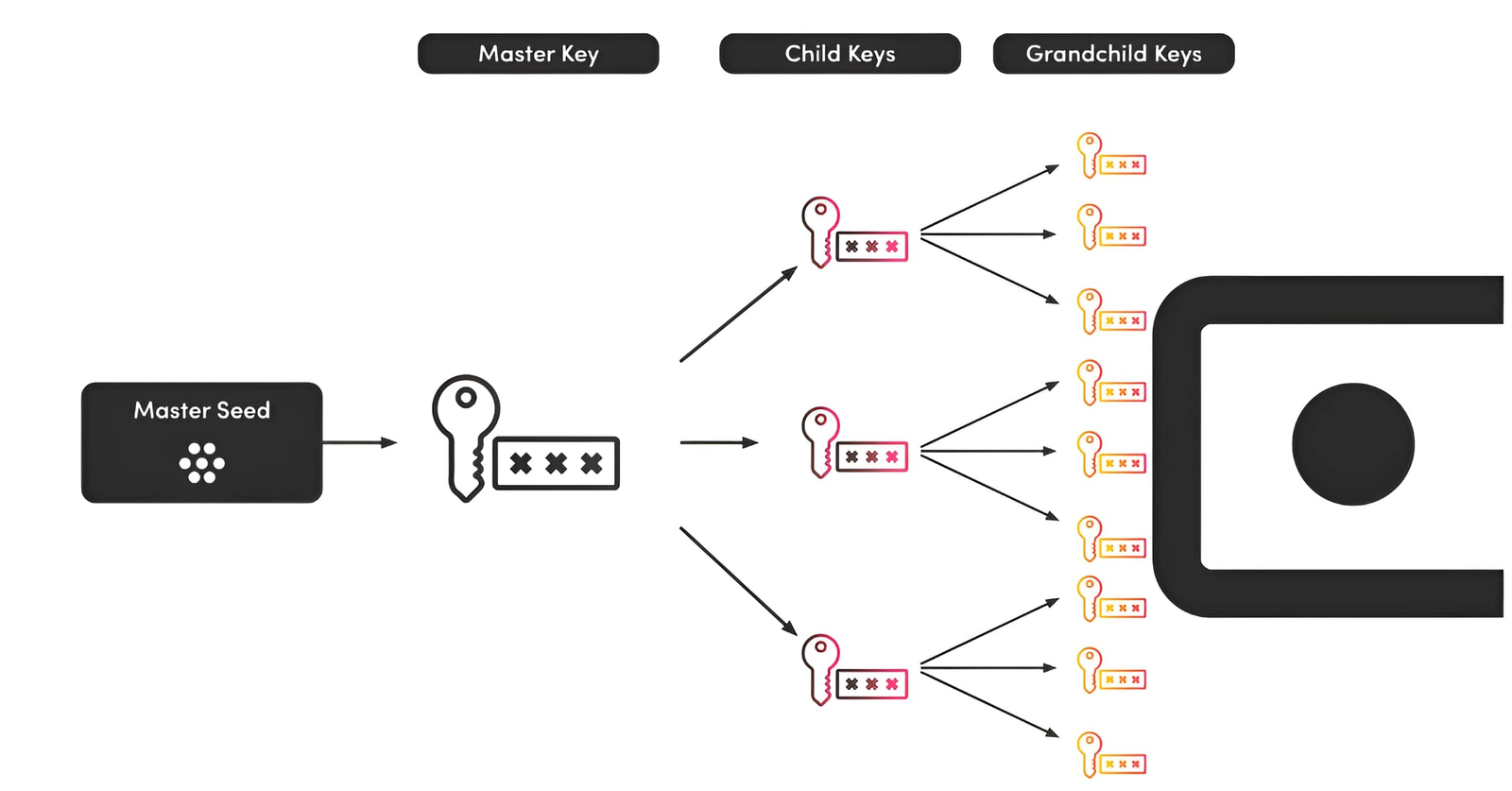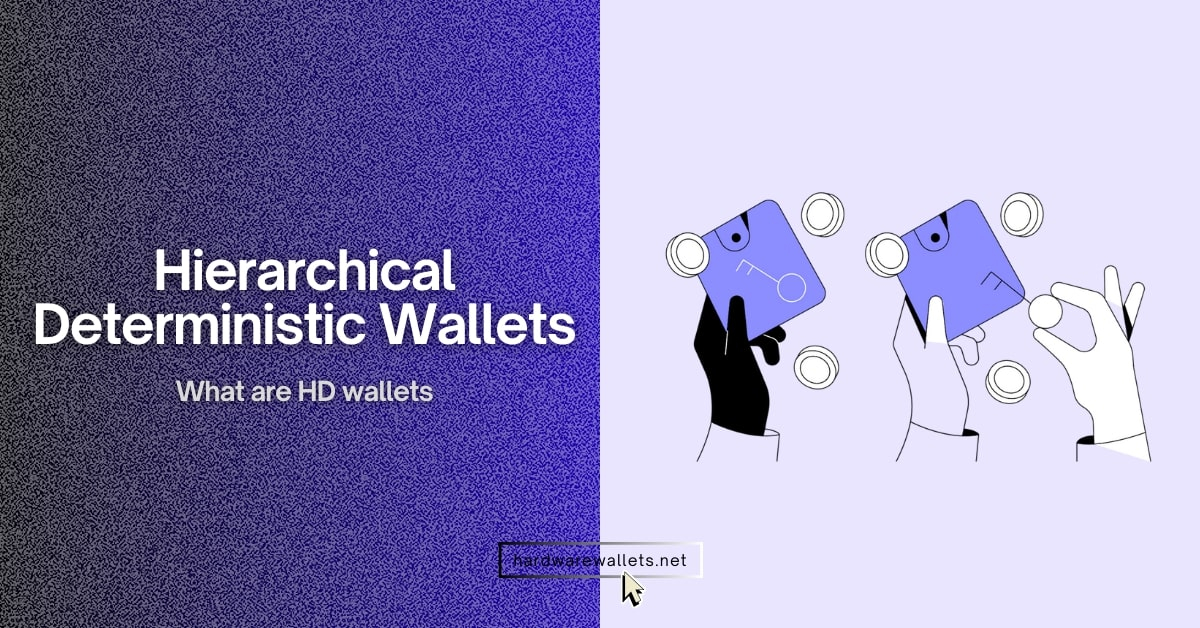- One secret phrase, endless addresses: HD wallets let you manage countless crypto addresses using just one recovery phrase (usually 12 or 24 words). So, once you back up that one phrase for your wallet, you’ve basically backed up your entire crypto wallet.
- Standard since 2013: The HD wallet concept was introduced around 2013 and has become the norm since then. Well, nearly all modern crypto wallets, the name that comes to your mind, like Ledger, Trezor, ELLIPAL, MetaMask, and Keystone, eventually use this system.
- Simpler backups and recovery: You just keep one seed phrase safe instead of juggling separate keys for each address, so that way, even if your device is lost or breaks, you can easily recover all your coins and addresses on a new wallet by entering your one phrase.
- Better privacy by design: HD wallets make it easy to use a new address for every transaction. Hence, this actually means you don’t have to reuse addresses. It can help protect your privacy. People can’t easily tie all your transactions to a single public address if you keep using fresh ones every time.
- All major wallets support it: Today, from hardware wallets (Ledger, Trezor, etc.) to many software wallets, using an HD wallet is basically standard practice now. So, if your wallet gives you a mnemonic phrase, you can say it’s an HD wallet.
What is an HD Crypto Wallet?
A Hierarchical Deterministic (HD) wallet is just a crypto wallet that can generate a whole tree of addresses and keys from one master seed. So, in plain language, it’s like having one master key (the seed) that can actually open many different locks (your individual crypto addresses). You only have to care about that master key, and the wallet takes care of creating all the child keys for you.

Now, let’s break down: “hierarchical” basically means it’s organized like a family tree, so it has both the parent and child keys. “Deterministic” means it’s predictable. Given the same seed, the wallet will always generate the same addresses in the same order.
So if you have your seed phrase written down, you can actually lose the wallet device or app, get a new one (or use a different wallet app), and deterministically get all your old addresses back by inputting that same phrase.
Put more simply, an HD wallet begins with a single seed, or random secret. All of your Ethereum, Bitcoin, and other addresses originate from that single seed using a repeatable mathematical procedure. Your wallet app simply keeps providing you with new addresses when you need them, and you might not even be aware of it. In the background, however, it uses that one seed to generate each new key and address in an organized manner.
Comparing HD vs Non‑HD (JBOK) Wallet
| Feature | HD wallets | Non‑HD (JBOK) wallets |
|---|---|---|
| Key generation | All keys derived from one seed | Each key generated randomly |
| Backup process | Back up a single seed phrase | Back up every individual key |
| Privacy | Easy to use a new address every time | Addresses often reused |
| Organisation | Tree structure allows accounts and sub‑accounts | No hierarchy, just a “bunch of keys” |
| Risk if seed/keys leak | One seed leak exposes everything | One leaked key only exposes that address |
Why were HD wallets created (the problem they actually solved)
To really get what HD wallets are, you need to know how things worked before. So, back in Bitcoin’s early days, wallets were what people now call non-deterministic. That just means every time you made a new address, the wallet would spit out a completely random key.
No link to your old ones…
You had to back up each key by itself. Now, imagine having 10 addresses and 10 separate backups. You miss even one, and the coins sitting on that address were basically gone. That setup was a pain for normal users, as it was way too easy to mess something up.
Then, around 2012 or so, developers started talking about a better solution. Out of that came the idea for HD wallets, so instead of generating totally random keys, the wallet would use one main seed and create all your future keys from that.
Now you only need to back up that one seed phrase and you’re safe. Make 5 addresses or 5,000; they all come from that single source.
Honestly, this made crypto way easier to use. Later, BIP-39 introduced the 12 or 24-word recovery phrases most people know today. By 2014, wallets like Trezor had already made this the default, and if you’re using any modern wallet today, you’re probably using this system without even thinking about it.
Technical PoV: How do HD wallets actually work
Actually, when you create an HD wallet, the following happens behind the scenes:
- Generate a seed phrase: A random number between 128 and 256 bits is chosen by the wallet software, which then adds a checksum and turns it into a list of words from the BIP-39 dictionary. Your backup phrase is actually made up of those words.
- Derive the master and extended keys: A key derivation function (PBKDF2 with HMAC-SHA512) receives your seed phrase and uses it to generate a master private key and also a companion code known as a chain code. Now, they combine to create an extended private key (XPRIV), and then the wallet also generates an extended public key (XPUB).
- Derive child keys: Hence, to derive a child key, the wallet combines the parent extended key with a child index via HMAC‑SHA512. So, if the index is less than 2³¹, the derivation is non-hardened, and a child public key can be derived directly from the parent public key. But if the index is 2³¹ or greater, the derivation is hardened, and you will require the parent private key. You can continue to derive further branches for other coins and accounts, and since the process is deterministic, you can reproduce the whole tree on any device provided that you secure your seed.
What are the Benefits of Using HD Wallets
The benefits of using HD wallets are that they allow one backup phrase for all addresses and make recovery easy on any compatible wallet. They also improve privacy with new addresses and keep multiple accounts organized under one seed.
- I love the aspect that with HD wallets, you only have to back up a single seed phrase, and that single backup secures everything.
- Restoring a wallet is also rather straightforward. All of the HD wallets you will work with operate on the same standard, so if you happen to lose your hardware wallet, you can generally create a new one and restore all your money with that same seed.
- Another thing I like is how easy it is to obtain a new address whenever you want one. It’s wonderful for privacy.
- HD wallets also allow me to keep things tidy. You can easily set up one account for long-term savings, one for my everyday spending, and even individual accounts for separate projects. They all derive from the same seed, so you still only need to protect one phrase.
What Risks Can You Expect
The risks of using HD wallets are: losing the seed phrase means losing all funds, and using the wrong wallet path can hide balances.
- Single Point of Failure (The Seed): The seed phrase is a secret key because everything starts with it. The keys to all of your addresses are in the hands of whoever manages to obtain your 12/24-word seed. Now, with separate keys in the past, only the money at that address was at risk if one key was stolen. The opposite of “one backup for all” with HD wallets is “one target for all.” Therefore, you must keep that seed phrase private and never ever give it to anyone.
- Device or Software Compatibility: You know, by default, not all wallet apps use the same address paths. You might not see your money right away if you restore your seed in a different wallet because it might be looking at a different “branch” of the HD tree. Although this may cause confusion, your coins are still there; all you need to do is access them using the same wallet software or the appropriate settings.
- False Sense of Privacy: I pointed out that privacy is a benefit, but again, keep in mind that using new addresses isn’t a magic disguise. You may still link your addresses together if you’re not careful (for example, sending money from several “new” addresses into a single transaction ties them on-chain). Additionally, some analytical tools have the ability to group addresses that are part of the same wallet. HD wallets do not make you invisible, but they do help with privacy. So, good practices still hold true, such as avoiding combining all of your outputs too frequently.
Are All Wallets HD Wallets? (Examples of Popular Wallets)
By now, you might be wondering, “Do all wallets use HD seeds these days? What about the one I’m using?” The short answer: yes, almost all modern wallets are HD wallets, especially if they gave you a mnemonic seed phrase to write down. It has become the industry standard nowadays.
To name a few, the best HD wallets are Ledger, Trezor, MetaMask, Trust Wallet, ELLIPAL Titan, Exodus, and many more.
Read my guides: Best crypto hardware wallets and best cold storage wallets
